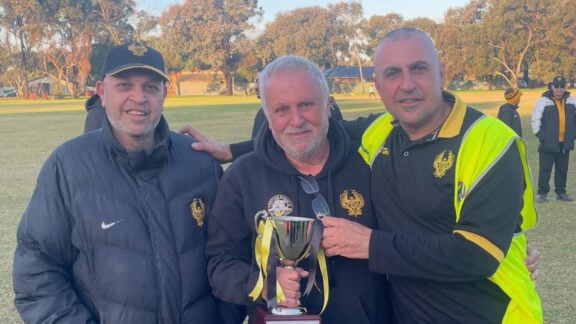Pavlos Andronikos, a former general secretary of SEKA Victoria and a lecturer of Modern Greek at Monash University recently shared a link on popular social media platform Facebook, which pertained to public commentary made by Cyprus’ Interior Minister Nicos Nouris.
The link was censored and wrongfully limited from viewers after it was shared in the Free Cyprus facebook group by Mr Andronikos. His post was blocked by Facebook and labeled as ‘spam’.
Mr Nouris had stated that the government and the people of Cyprus unreservedly denounce the Russian invasion and stand firmly beside the people of Ukraine.
However, when asked about Turkey’s stance and Ankara’s promise to act as a peace conduit in the Eastern Mediterranean region, the Minister said: “Turkey assumes the role of a state that would bring balance, continuing this absurd course, paralleling even its own demand to join the EU with Ukraine’s case”.
“And this when as a country candidate for EU membership and a NATO member state, it consciously chooses not to abide by the decisions and the responsibilities stemming from a series of agreements and commitments,” he highlighted.

Agreeing with the commentary, Mr Andronikos wanted to share the link as published by legitimate media source News In Cyprus, which was initially shared by Cyprus Mail and Cyprus News Agency. The title clearly stipulates that the article is about the comments made by minister Nouris. Comments that have been made several times in the past and concern the predicament of an entire nation; an unresolved crisis that remains a reality for Cypriots.
It is worth mentioning that Turkish President Recep Tayyip Erdogan’s depiction of Turkey as a bastion of anti-imperialism is not new—though it is an increasingly common theme of the Turkish narrative both on a national and international level, which has been red flagged many times by the United Nations, the European Union and NATO. Dozens of media outlets and organisations have dubbed Turkey to be the leading Imperialist state of the modern world with China and Russia to follow. The list includes Newsweek, The Middle East Institute, The Guardian, BBC News, NY Times, The Conversation to name a few.


Even though the option to disagree with Facebook’s incorrect decision to censor the post is available, Facebook shut down the efforts to share the post again with the excuse of COVID-19 and lack of staff to conduct a proper review.
Seeing this response, Mr Adronikos forwarded screenshots of the incident to Neos Kosmos in an attempt to raise awareness on how strict and unwarranted Facebook’s rules when it comes to censorship have become, jeopardising free speech.
“Our problem is that there is very little we can do,” he told Neos Kosmos, stressing that the existence of the group ‘Free Cyprus’ where the link was intended to be shared amongst members, is based on this narrative, the destruction and loss suffered due to the Turkish invasion in Cyprus.
“Facebook makes a decision, gives you no reasons, and that’s it, you have been silenced,” he added noting that this is just an example of how censorship laws especially in Australia can affect what we can say and share in the future.
Facebook has been called out by users and media organisations many times over recent years and has officially defended its willingness to regularly censor religious and political content at the request of oppressive regimes by claiming it simply follows the laws of the countries where it operates.
Last year, Facebook won concessions from the Australian government by temporarily shutting down the news for users of its platform in retaliation for a law that would harm its bottom line. If the Treasury Laws Amendment (News Media and Digital Platforms Mandatory Bargaining Code) Bill 2021 had passed as originally proposed, the News Media Bargaining Code would have required Facebook, along with other giant tech sites, to pay publishers for their content. Instead Facebook was able to selectively make deals with major publishers and ignore others, especially small publishers. On 23 February 2021, Facebook agreed to restore news pages on its site in Australia after saying that it had reached a favorable deal with the government.
The conflict in Australia is seen as a test case for new forms of regulation on big tech platforms like Google and Facebook and is being closely watched around the world.








